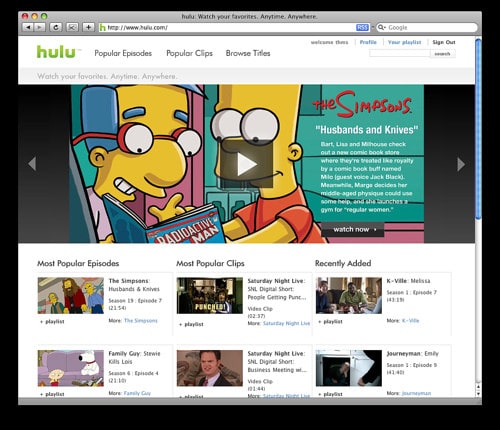 Hotspot Shield is the popular method for getting access to US-only websites but is ad-heavy, and since Hulu and other providers are on to it, isn’t as reliable as it once was. Those of you outside of the US can still access Hulu, Netflix instant streaming, and other US-only websites using these good alternatives.
Hotspot Shield is the popular method for getting access to US-only websites but is ad-heavy, and since Hulu and other providers are on to it, isn’t as reliable as it once was. Those of you outside of the US can still access Hulu, Netflix instant streaming, and other US-only websites using these good alternatives.
In addition to watching TV, using these proxies can be a good way to get lower airfare if you’re in Europe by booking on Kayak, or some other site that thinks you’re in the US.
(Be careful what information you send across a proxy you didn’t set up yourself. It’s best to use a one-time credit card if your bank offers it.)
Free Programs
Reader Andrew sent me a great list of alternative programs, all of which I’ve downloaded and tested (on Windows, Mac, and Linux). These are the easiest alternatives to use because they don’t require you to set much up and are free.
- FreeVPN (Windows only) – Out of all the virtual private network (VPN) software I tested, FreeVPN was the easiest to use, set up, and the least intrusive. Once you download and install the program, it sits in your taskbar and does it’s magic as you turn it on or off.
- UltraVPN (Windows, Mac) – Similar in setup to FreeVPN and available for Mac, except that UltraVPN requires you to set up a username and password. Make sure to use a password you don’t use for your email or any other accounts.
- FoxyProxy (Windows, Mac, Linux) – FoxyProxy is an application that you install but requires you to change some settings on your browser (Internet Explorer, Firefox) to get the proxy to work. It’s not much work and is a one time setup. A good proxy that also works on Ubuntu Linux.
There are some paid alternatives out there which I didn’t try. They run anywhere from $30-100 annually and the quality and service varies. The free methods listed above should be enough to meet your needs in most cases.
 Set Up Your Own VPN
Set Up Your Own VPN
There are two ways to set up your own VPN. One is to have a computer that running somewhere in the US (i.e. in your parent’s house) and the other is to purchase some cheap hosting or use an existing Web server you may have. Basically the computer just needs to be in the US, running, and connected to the Internet.
Other Alternatives
- Hamachi (Windows, Mac, Linux) – Makers of the popular remote desktop solution LogMeIn also have a free VPN service you can sign up for called Hamachi.
For many of you watching your favorite sitcoms abroad makes VPN software like these essential tools for digital nomads. Remember though that all the data you send through a VPN that you didn’t set up yourself might not be absolutely private. Avoid sending across passwords, credit card numbers, and anything else you wouldn’t want someone else to read.












Graboid is also a great paid alternative, with streaming and downloadable options. I use this several times weekly here in Guatemala, and the quality is always good to excellent.
It looks pretty good except that $4.95/month price. Have you compared the quality and reliability to these free options? I’d be curious to hear your take on it.
I tried Hotspot Shield and FreeVPN. The quality was ok with those, but even with FreeVPN, after a use or two, I kept getting denied access to Hulu due to my location. Frankly, I wasn’t interested in continuing to look for free programs that I had to install, increasing the likelihood of viruses, etc., so the relatively small price tag was not a big deal for me. Since I live here, not just traveling, I wanted a somewhat dependable, permanent solution.
The quality is superb, equal or better quality than Hulu every single time, and it could be downloaded. I’m not trying to derail your blog post, for sure, and I’m sure many on your list are fine, I just haven’t tried to them all.
Great blog, by the way. I have you on my RSS reader and you’re one of the first I pull up.
Hi Benjamin,
Thanks for the advice and comparison of the options. I haven’t tried any of the pay solutions but it’s not too much to pay especially as Hulu and some other sites start implementing measures to throw off some of the predominant VPN/proxy software out there.
Thanks again, I appreciate you reading and contributing.
-Anil
great! I didn’t know this and have been trying to watch SNL for ages! life saver!
You should check out the recent Taylor Swift episode – unexpectedly funny.
i should have installed this prior going to China… i’ll install your recommendation as soon as i move to vietnam…
Let me know if you need help setting things up. I’d recommend having two VPNs ready to go in Vietnam and the neighboring countries.